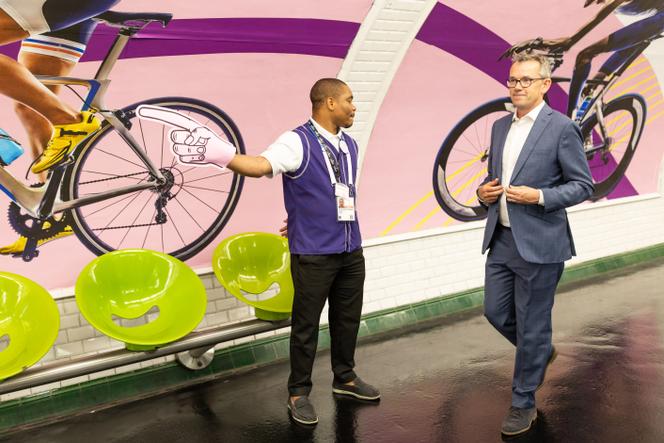


Better than good! The promise of the first Olympic Games to be fully accessible by public transport, bicycle, or on foot has been fulfilled. To the point of reconciling Ile-de-France residents – those who haven't fled the Paris region, anyway – with the metro and RER. Tourists, assisted by the numerous staff in purple vests, were guaranteed a seat except during stadium exits, even with the summer schedule adjustments, the RATP and SNCF rose to the challenge.
On Tuesday, August 6, at the RER C operations center, which has served 12 Olympic venues, Séverine Lepère, SNCF network director for Ile-de-France, was all smiles in front of a screen displaying the statistics: 99.05% of trains on time. A near-perfect score for Ile-de-France's oldest line, which often encounters problems or undergoes maintenance.
Meanwhile, in the RATP headquarters, CEO Jean Castex was showing several screens to the transportation minister, Patrice Vergriete: During the Olympic Games, 11 out of 14 metro lines posted regularity results above 100%. This means that the well-prepared authority ran more metros than required by Ile-de-France Mobilités (IDFM), the transport organizing authority. "I'm a happy minister," concluded Vergriete.
On Thursday evening, he invited the transport operators (RATP, SNCF, but also Keolis, and Transdev) to the gardens of his ministry to thank and congratulate them. Vergriete also invited SNCF Réseau railway workers, who repaired the three high-speed lines sabotaged on the day of the opening ceremony in record time.
The stars of the evening, the four agents from the southeast line who saved the traffic by driving off the saboteurs at Vergigny (Yonne region), recounted their crazy night of July 25-26. At 1:30 am, as they were about to carry out a maintenance operation, they noticed white spots: the sneakers of two men dressed all in black, lurking in the dark. Caught in the act, they ran off, leaving behind four plastic bottles filled with gas.
On Friday afternoon, Valérie Pécresse, president (LR) of the Ile-de-France region and IDFM, partner of Paris 2024, provided some figures: 3.5 million Parisians remained during the Games, as many as in other summers, and IDFM transported 500,000 spectators a day in addition. She promised that the extra revenue would cover the €250 million budgeted to increase the transport provision compared with a usual summer. "There will be no Olympic debt for Ile-de-France residents," she insisted, before boasting of the "gains" to come.
You have 61.22% of this article left to read. The rest is for subscribers only.
